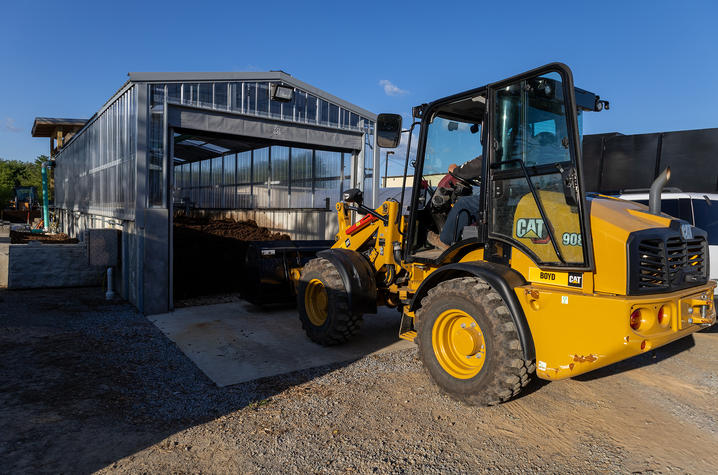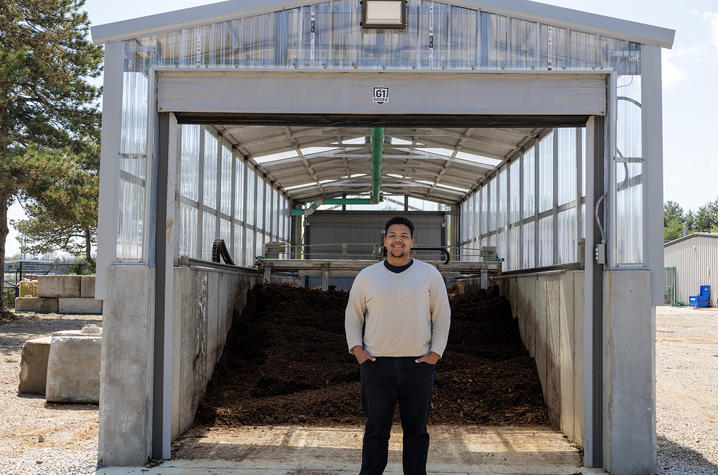UK Facilities Management launches new on-campus composting system
LEXINGTON, Ky. (April 22, 2025) — The University of Kentucky is turning food waste into a high value soil amendment with its newly launched composting system — an innovative, on-campus facility designed to expand composting operations and support UK’s commitment to becoming a zero-waste campus by 2030.
Spearheaded by UK Recycling and UK Sustainability in Facilities Management, the new process uses an in-vessel, aerated composting system that dramatically improves the university’s ability to process organic waste. The system transforms food scraps and wood chips into nutrient-rich compost in a matter of weeks, using controlled airflow, moisture regulation and automated mixing via a giant corkscrew-like auger.
“The system looks a bit like a train rail car,” said Ryan Lark, zero-waste specialist at UK. “But what makes it unique is the level of control we have over the composting process. This allows us to handle more material more efficiently — right here on campus.”
Previously, UK transported campus food waste daily to Woodford County through a partnership with the Martin-Gatton College of Agriculture, Food and Environment. The six-year partnership made the first stage of the university's composting efforts possible but transporting the food waste limited collection expansion and placed strain on resources and equipment.
“Our partnership with the Martin-Gatton College of Agriculture, Food and Environment was instrumental to our efforts to launch food waste diversion efforts and is still vitally important,” said Shane Tedder, facilities services and sustainability director. “The team at the C. Oran Little Research Facility continues to be a key partner and is willing to accept material when issues arise with the on-campus system.”
With the support of a 2022 state grant, Facilities Management was able to build the new system on campus, dramatically increasing the efficiency of food waste collection and reducing transportation costs and emissions. The new system became operational last month and is processing food waste collected from every dining location on campus, Athletics facilities and some residential locations.
UK Grounds plays several key roles with the new system. The system is co-located with some of its operations, with employees trained to assist with daily tasks. Once the compost has completed its composting and curing process, the team will use it for campus turf, flower beds and mulch.
“We’re excited about using compost as a more organic approach to support our plants on campus,” said Corey Baker, grounds manager. “We will also be top dressing our turf across campus which will improve soil health and our stormwater management by helping nutrients and water soak into the soil rather than run off.”
Already, the benefits are clear.
“Our food waste collection drivers used to finish their daily routes around 1 p.m. Now they're done around 10 a.m.,” Lark said. “That’s time saved, less wear on our vehicles and more capacity for future expansion.”
UK Dining is also a key campus partner in the composting initiative.
“UK Dining is looking forward to the opportunities that the new composting system will create for further expansion of our food waste collection program, while also reducing greenhouse gas emissions produced by transport,” said Erin Hafner, director of sustainability in UK Dining. “Having a compost facility on campus will be a win for our operations and the environment.”
Student Spotlight: Jacob Hampton tells UK’s composting story
As part of UK Recycling’s educational outreach, Jacob Hampton, a digital media and design senior in the College of Fine Arts, created a video highlighting the composting system during an internship this semester.
“I’ve grown a lot through this project,” Hampton said. “It helped me be more creative and understand the people behind composting efforts on campus. Not everyone gets chances like this and having opportunities to gain real word experience is so beneficial for students.”
Hampton’s connection to composting goes beyond campus.
“My aunt used compost for her garden when I was growing up, so I know firsthand how it can turn waste into something valuable. People need to understand composting’s environmental benefits,” he said.
The new composting system is a powerful step toward a more sustainable campus. By turning yesterday’s food scraps into tomorrow’s nutrients, UK is reducing waste, enriching the campus environment and demonstrating leadership for a greener future.
Learn more about UK Sustainability at sustainability.uky.edu and UK Recycling at recycleblue.uky.edu.


As the state’s flagship, land-grant institution, the University of Kentucky exists to advance the Commonwealth. We do that by preparing the next generation of leaders — placing students at the heart of everything we do — and transforming the lives of Kentuckians through education, research and creative work, service and health care. We pride ourselves on being a catalyst for breakthroughs and a force for healing, a place where ingenuity unfolds. It's all made possible by our people — visionaries, disruptors and pioneers — who make up 200 academic programs, a $476.5 million research and development enterprise and a world-class medical center, all on one campus.




